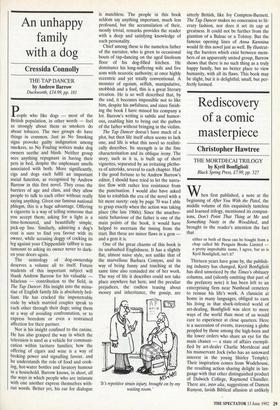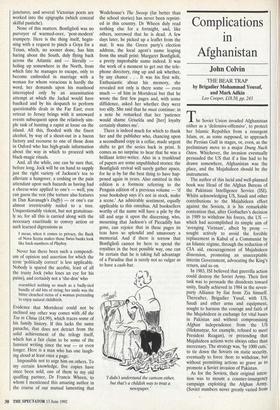Rediscovery of a comic masterpiece
Christopher Hawtree
THE MORTDECAI TRILOGY by Kyril Bonfiglioli Black Spring Press, £7.99, pp. 527 When first published, a note at the beginning of After You With the Pistol, the middle volume of this exquisitely tasteless and learned trilogy, mentioned its compan- ions, Don't Point That Thing at Me and Something Nasty in the Woodshed, and brought to the reader's attention the fact that either or both of these can be bought from a chap called Mr Penguin Books Limited a pretty improbable name, I agree, but so is Kyril Bonfiglioli, isn't it?
Thirteen years have gone by, the publish- ing industry has changed, Kyril Bonfiglioli has died unnoticed by the Times's obituary columns, and (silently omitting that part of the prefatory note) it has been left to an enterprising firm near Nunhead cemetery to reissue his life's work. A classicist at home in many languages, obliged to earn his living in that shark-infested world of art-dealing, Bonfiglioli was alert to more ways of the world than most of us would care to experience at close quarters. Here is a succession of events, traversing a globe peopled by those among the high-born and the lower orders who share an eye for the main chance — a state of affairs exempli- fied by art-dealer Charlie Mortdecai and his manservant Jock (who has an untoward interest in the young Shirley Temple). Their inspiration comes from Wodehouse, the resulting action sharing delight in lan- guage with that other distinguished product of Dulwich College, Raymond Chandler. There are, inter alia, suggestions of Damon Runyon, lavish Biblical allusion at unlikely
junctures, and several Victorian poets are worked into the epigraphs (which conceal skilful pastiche).
None of this matters. Bonfiglioli was no purveyor of warmed-over, 'post-modern' trumpery. Here is the thing itself, begin- ning with a request to pinch a Goya for a Texan, which, no sooner done, has him haring about the South, duly flying back across the Atlantic and — literally holing up somewhere in the North, from which fate he manages to escape, only to become embroiled in marriage with a woman for whom voracious is hardly the word, her demands upon his manhood interrupted only by an assassination attempt at which the Jackal would have baulked and by his despatch to perform questionable deals in the Far East; even retreat to Jersey brings with it untoward events subsequent upon the relatively sim- ple task of hunting a rapist at loose on the island. All this, flooded with the finest alcohol, by way of a shoot-out in a bacon factory and recourse to one of those dons in Oxford who has high-grade information about the way in which to proceed with black-magic rituals.
And, all the while, one can be sure that, before long, Jock will be on hand to supply just the right variety of Jackson's tea to alleviate a hangover, a coshing or the pain attendant upon such hazards as having had a cheese-wire applied to one's — well, you can guess the rest (the torture also features in Dan Kavanagh's Duffy) — or one's ear almost irretrievably nailed to a tree. Unquestionably violent, but not gratuitous- ly so, for all this is carried along with the necessary exactitude to convey action or such learned digressions as I mean, when it comes to privacy, the Bank of Nova Scotia makes those Swiss banks look like back-numbers of Playboy.
Never has there been such a compendi- um of opinion and assertion for which the term 'politically correct' is less applicable. Nobody is spared the acerbic, least of all the trusty Jock (who loses an eye for his pains), and certainly not a `she-don' who
resembled nothing so much as a badly-tied bundle of old bits of string; her smile was the bitter clenched rictus of a woman pretending to enjoy natural childbirth.
Evidence that Mortdecai could not be inclined any other way comes with All the Tea in China (£4.99), which traces some of his family history. If this lacks the same panache, that does not detract from the solid achievement of the trilogy itself, which has a fair claim to be some of the funniest writing since the war — or even longer. Here is a man who has one laugh- ing aloud at least once a page.
Impossible not to urge him on others. To my certain knowledge, five copies have since been sold, one of them to my old quaffing partner, Dr Francis Wheen, to whom I mentioned this amazing author in the course of our mutual lamenting that
Wodehouse's The Swoop (far better than the school stories) has never been reprint- ed in this country. Dr Wheen duly read nothing else for a fortnight, and, like others, sorrowed that he is dead. A few days later, he picked up a leaflet from the mat. It was the Green party's election address, the local agent's name leaping from the small print: Margaret Bonfiglioli, a pretty improbable name indeed. It was the work of a moment to get out the tele- phone directory, ring up and ask whether, by any chance . . . It was his first wife. Enthusiastic about his memory, she revealed not only is there some — even much — of him in Mortdecai but that he wrote the first few pages and, with some diffidence, asked her whether they were too silly. She said that he must continue: in a note he remarked that her 'patience would shame Griselda and [her] loyalty certainly shames me'.
There is indeed much for which to thank her and the publisher who, chancing upon a secondhand copy in a cellar, made urgent shifts to get the series back in print. It comes as no surprise to hear that he was a brilliant letter-writer. Also in a trunkload of papers are some unpublished stories: the Bonfiglioli revival will surely gather apace, for he is by far the best thing to have hap- pened again in years. Also omitted in this edition is a footnote referring to the Penguin edition of a previous volume — your bookshop says it's not in stock, make a scene.' An admirable sentiment, equally applicable to this omnibus. All booksellers worthy of the name will have a pile by the till and urge it upon the discerning, who, mourning that Jackson's of Piccadilly has gone, can rejoice that in these pages its teas have so splendid and unsavoury a memorial. And if there is sorrow that Bonfiglioli cannot be here to spend the royalties in the best possible way, one can be certain that he is taking full advantage of a Paradise that is surely not so vulgar as to have a cash-bar.
'I didn't understand the cartoon either, but that's a childish way to treat a newspaper.'



















































 Previous page
Previous page